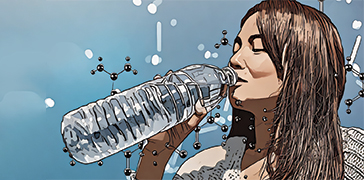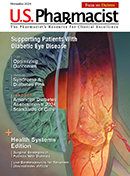US Pharm. 2024;49(11):15-16.

Excessive Thirst and Urination
Diabetes insipidus (DI) is a rare condition in which there is a problem with a hormone called antidiuretic hormone (ADH). Approximately one in 25,000 people are affected worldwide. It is related to neither type 1 or 2 diabetes nor gestational diabetes, in which there is a problem regulating sugar in the body. In DI, either the body does not make enough ADH or the kidneys do not use ADH properly. This causes an imbalance in bodily fluids that makes a person unable to retain water, resulting in the generation of too much urine. People who suffer from DI urinate multiple times a day and drink extremely large volumes of water because they feel so thirsty. If left untreated, individuals with DI can suffer from dehydration and electrolyte abnormalities.
What Causes Diabetes Insipidus?
ADH, also known as vasopressin, is a hormone that is made in a part of the brain called the hypothalamus. Specifically, the pituitary gland is responsible for storing and releasing ADH, a hormone that helps the body maintain water balance by controlling the amount of water that the kidneys reabsorb. The kidneys filter fluid in the blood to remove waste, and most of it returns to the bloodstream with the help of ADH. By doing so, the kidneys normally reabsorb water instead of getting rid of it through the urine.
There are several types of DI. Central DI occurs when there is damage to the hypothalamus or pituitary gland from surgery, a tumor, head injury, or illness. This affects the production, storage, or release of ADH. An inherited autoimmune condition can cause the immune system to damage the cells that make ADH. Nephrogenic DI is when the kidneys do not respond to ADH appropriately. This can be inherited or the result of medications such as lithium, low potassium levels, high calcium levels, blocked urinary tract or urinary tract infections, or chronic kidney conditions. Gestational DI occurs only during pregnancy where an enzyme made by the placenta destroys ADH. Primary polydipsia, also called dipsogenic DI, can result from damage to the thirst-regulating mechanism in the hypothalamus.
Presentation and Diagnosis
Those with DI can experience extreme thirst, prefer cold water, make large amounts of pale urine, and get up to urinate and drink water often throughout the night. Young children or babies may have heavy, wet diapers or experience bed-wetting, weight loss, poor growth, vomiting, irritability, constipation, headache, sleep issues, vision problems, or fever.
People can develop DI at any time. Risk factors for DI include a family history of DI, brain surgery, major head trauma, medications that cause kidney problems, such as diuretics or those for bipolar disorder, or metabolic disorders. The doctor will need to know the symptoms and medical history. He or she may perform a urine test to measure how concentrated the urine is. The doctor may also measure the amount of ADH in the blood. A water-deprivation test could be used in which fluid intake is halted for several hours to see how much urine is made, check the patient’s body weight, and see what changes occur in the ADH concentrations in the urine and blood. The doctor may give the patient a form of ADH to see if the kidneys respond. Magnetic resonance imaging could be used to look for any abnormalities in the hypothalamus or pituitary gland. Genetic testing may be appropriate if there are family members who exhibit DI symptoms, too.
DI Treatment Depends on the Cause
Management of DI depends on the cause. If the DI is mild, drinking more fluids to prevent dehydration may be enough. If there is another disorder causing DI, the underlying cause must be treated first. If the issue is with ADH production, desmopressin—a manufactured hormone—can be used to help lower the amount of urine that the body makes. It is important to follow up with the doctor while taking desmopressin, as the dosage may need to be adjusted. Too much desmopressin can cause fluid retention and lead to electrolyte abnormalities. Desmopressin can be used to treat gestational DI, too. If the issue is that the kidneys do not respond to ADH, then a low-salt diet can help lower the amount of urine that the kidneys make. Water pills or nonsteroidal anti-inflammatory drugs could potentially help with this form of DI. If a medication is causing the DI, ask the doctor if the drug can be stopped and if there is an alternative treatment that can be used.
The content contained in this article is for informational purposes only. The content is not intended to be a substitute for professional advice. Reliance on any information provided in this article is solely at your own risk.
To comment on this article, contact rdavidson@uspharmacist.com.





